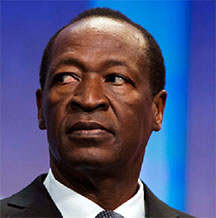OUAGADOUGOU, (Reuters) – Burkina Faso President Blaise Compaore resigned yesterday amid mass street protests at his attempts to extend his 27-year rule, plunging the West African nation into uncertainty as junior officers vied with top military brass for power.

Compaore, a taciturn former soldier in office since a 1987 military coup, had sought to defy popular pressure for him to step down after a day of violent unrest on Thursday in which demonstrators burned parliament and ransacked state television.
Impoverished Burkina Faso had emerged under Compaore as a key mediator in the turbulent Sahel and his departure robs the region of a wily elder statesman — though one often criticised for his rights record and meddling in his neighbours’ affairs.
The landlocked nation has become a key ally in Western operations against al Qaeda-linked groups in West Africa and the unfolding political crisis was being closely watched by the United States and France, which has a special forces base there.
Diplomats voiced concern after military chief General Honore Traore’s announcement he was taking charge as head of state appeared to be challenged by presidential guard commander Lieutenant Colonel Issaac Zida, who announced his own set of emergency measures and deployed troops on the streets.
The demonstrations had erupted on Thursday when parliament had been due to vote on plans to change the constitution to allow 63-year-old Compaore to seek reelection next year. At least three people were shot dead and dozens wounded.
With hundreds of thousands packing the Place de la Nation in the capital Ouagadougou for a second day on Friday, and with no sign of international support — particularly from former colonial power France — Compaore bowed to public pressure.
“I believe that I have fulfilled my duty, my only concern being the higher interest of the nation,” said a written statement from Compaore read on national television, in which he called for elections within 90 days.
A heavily-armed convoy believed to be carrying the former president was seen travelling towards the southern town of Po near the border with Ghana, which is home to a large military base, diplomatic sources and local media said.
The departure of Compaore — until recently seen as one of West Africa’s most invulnerable Big Men — will send ripples across a region where a number of long-standing rulers are nearing the end of their terms amid rumbling discontent.
Crowds danced, cheered and blew whistles in Ouagadougou’s dusty streets after Compaore’s statement was broadcast.
“This is a sub-Saharan Spring and it must continue against all the presidents who are trying to hang on to power in Africa,” said law student Lucien Trinnou, referring to the Arab Spring that toppled several long-term leaders.
Jubilation turned to frustration, however, after General Traore — a former military aide de campe of Compaore — announced he was taking over the reins of power.
Under Burkina Faso’s constitution, the head of the National Assembly should take office if the president resigns but parliament was dissolved by Traore on Thursday under short-lived martial law, leaving a power vacuum into which he stepped.




